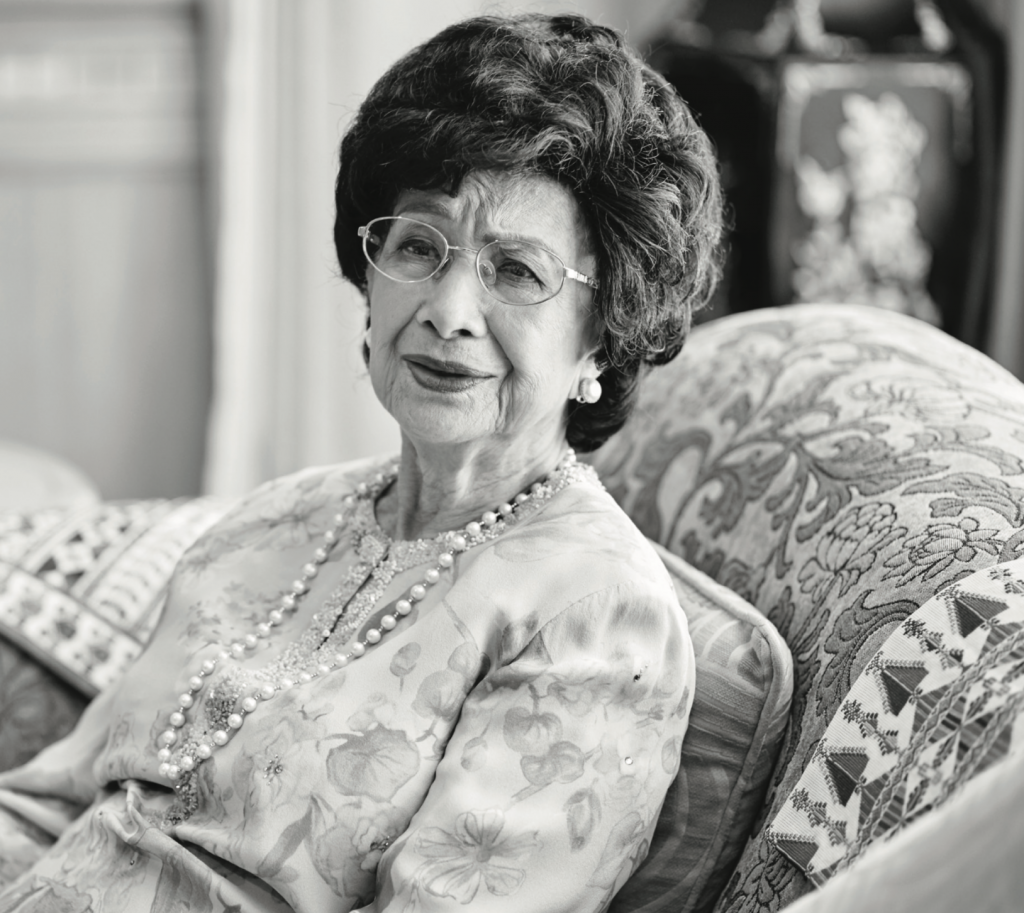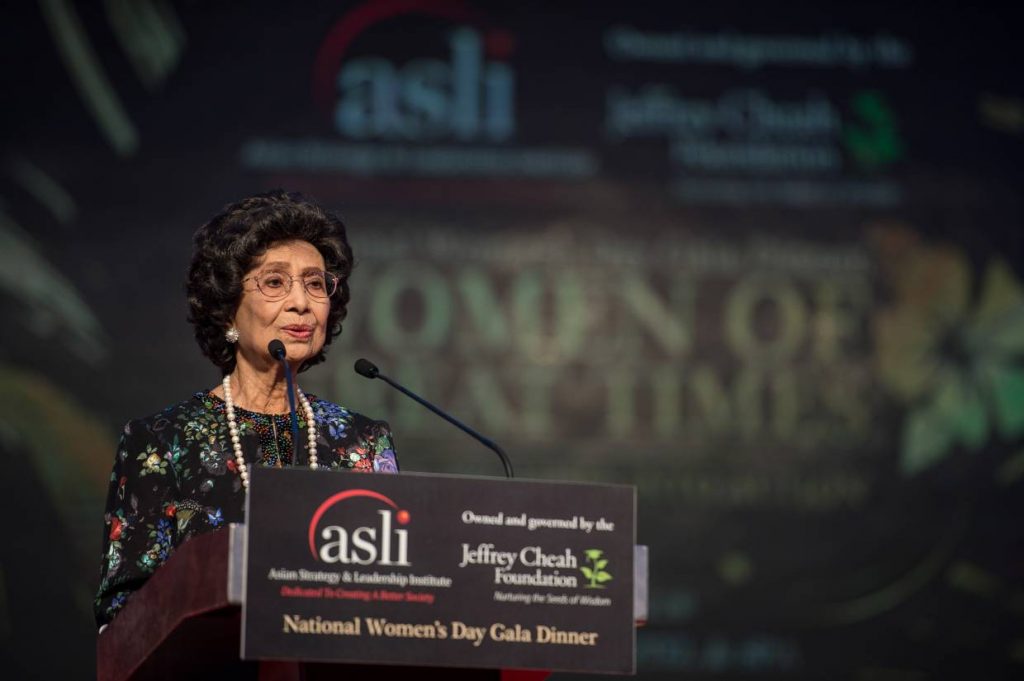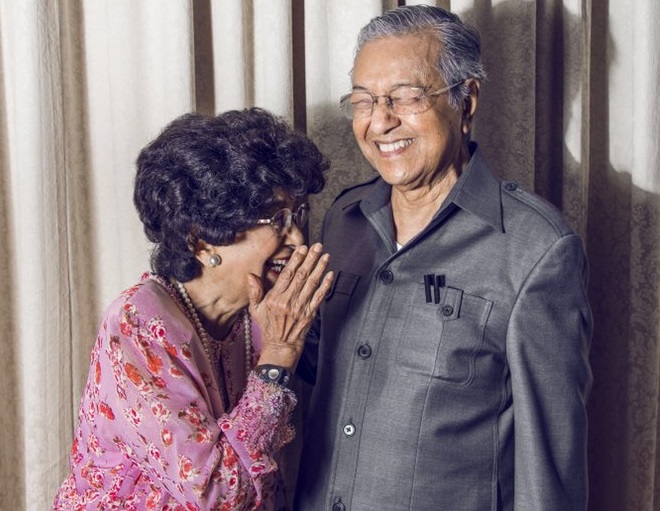

Doctor & Former First Lady of Malaysia
The diplomacy that comes from a more-than- two-decade role in the public eye is evident the moment Tun Dr. Siti Hasmah Mohd Ali walks into the room. She addresses each one of us by name – myself, the photographer as well as the make-up artist – and continues to make the crew feel at ease for the next hour.
Elegantly clad in a traditional baju kurung, complete with a string of pearls, Dr. Siti Hasmah continues to exude the quiet dignity that generations of Malaysians, who grew up under the administration of Tun Dr. Mahathir Mohamad, identify with her.
Yet, the wife of the premier, declares that she is just a “normal person” when we sit down for the interview, an assertion that seems contradictory to all that we know of her.
“I wanted to show that anyone can achieve what I have,” she explains the reason for writing the biography My Name is Hasmah, a statement that is perhaps a little hard to accept, particularly since apart from her role as the prime minister’s wife, Dr. Siti Hasmah was a pioneer in her own right, achieving much in her medical career.
She was the third Malay woman to become a doctor, the first to graduate from the Faculty of Medicine at University of Malaya in Singapore. She was the first woman to be appointed medical officer at the Maternal and Child Health Department in Jitra, Kedah and soon became the first State Maternal and Child Health Officer in the state.
Getting there, however, proved to be a challenge as Dr. Siti Hasmah candidly admits that her days as a medical student were pretty tough. She entered the first year of medicine without a background in Physics and Chemistry – the subjects weren’t offered at her alma mater St. Mary’s, resulting in Dr. Siti Hasmah experiencing her first setback in her very first year when she was referred in Physics.
“I expected to fail but I was determined and my father and siblings encouraged me,” she says, adding that for some reason, she escaped the fate of the boys who did not get through.
“They were asked to leave. The British probably had some affirmative action,” she explains. “They saw that the only Malay girl was very determined to study and decided to give her the opportunity.”
As a result, Dr. Siti Hasmah fell back a year, while Dr. Mahathir proceeded to the second.
“I didn’t mind because then I could understand my Physics,” she says, with a laugh. It also led to Dr. Siti Hasmah receiving help from Dr. Mahathir, who emerged as her “knight in shining armour”, as described in the book, when he volunteered to tutor her in Physics.
“The times we were together, people thought we were so romantic, but we were fighting all the time,” she says while laughing. “He didn’t know why I couldn’t understand Physics.”

Dr. Siti Hasmah continued to experience these setbacks throughout her university years.
“When I finally saw my name on the board that I had cleared all subjects, I wished my mother was there with me.”
Her parents, she says, were always encouraging, allowing her to pursue her ambitions.
“At the time (during the Japanese occupation) when you had young daughters of marriageable age, many parents married off their daughters, but my parents protected me. They said Hasmah wanted to study,” she explains.
“It is only with full determination that you can achieve something,” Dr. Siti Hasmah stresses while reiterating that it was the motivation behind My Name is Hasmah.
But it was those obstacles that led to a greater appreciation of her medical degree, citing that she counts herself “very lucky to have become a doctor”. That awakened a desire in her to contribute to society where health issues were concerned.
Dr. Siti Hasmah declares with much pride that she remained a government servant throughout her medical career. It was during those years that Dr. Siti Hasmah was confronted with the hardcore poor, and it was also during her years as a doctor working with rural communities that she witnessed the transformation that those communities underwent through the Rural Development Plan conceptualised by the late Tun Abdul Razak, Malaysia’s second Prime Minister.
“He is my idol,” she says. “If it wasn’t not for him, the rural areas would be as they were 60 or 70 years ago. He opened up the rural areas. It was a privilege to work under him.”
Dr. Siti Hasmah spent a year – 1955 – working in the paediatric ward of the General Hospital Kuala Lumpur. Back then, the wards had simple swinging doors that could barely keep the dogs and cats out. At the time, sanitation was poor in the city and patients were often plagued by two illnesses – diphtheria and tuberculous meningitis.
As a medical officer in Kedah, the young doctor had to deal with waterborne diseases like typhoid and cholera. It was at Kubang Pasu, she says, that she learnt to work with rural communities. There she discovered that one of the biggest problems was that medical attention was not sought on time. The community was prevented by a range of issues, from lack of means to cultural practices, including requiring the permission of elders to seek medical attention.
“I developed a personal relationship with people. Apathy, poverty, ill health, illiteracy. These are the four evils of the rural areas,” she states. “Each one has to be eliminated and each one is interrelated.”
Later as the first State Maternal and Child Health Officer in Kedah, Dr. Siti Hasmah succeeded in bringing infant mortality down from 75/1,000 to only 6/1,000. The future wife of the Prime Minister was then invited to Washington, DC to give a talk on how this was achieved. Years later, in that capacity, Dr. Siti Hasmah was invited again to present Malaysia’s successful implementation of its micro-credit system.
“I wanted people to know that you have to work very, very hard,” she says, adding that you have to be “really sincere” in dedicating yourself.
Dr. Siti Hasmah certainly has witnessed much change. Back in the day, a Malay woman would probably graduate with a medical degree once in 10 years. Now, she says, they graduate by the hundreds each year.
I want to see young people today have a good life in the future. They have a lot of aspirations but you must have education, know what is happening in your own country and help society.
Tun Dr. Siti Hasmah
Being a professional isn’t enough if it only benefits the individual, she says. Instead as leaders of tomorrow, the younger generation need to understand the vision and needs of the country.
“We have been given the opportunity to not just educate ourselves but to be given jobs and positions. Use this opportunity with a lot of wisdom and thought, you are responsible for future generations.”
Dr. Siti Hasmah turns 95 on July 12, 2021 and her life continues to change drastically, especially when Dr. Mahathir made a comeback to politics and eventually became the seventh Prime Minister in 2018.

I still don’t have my husband. People always tell me, look after Mahathir, but who is going to look after me?
Tun Dr. Siti Hasmah
“I have to be with him, to ensure that he is all right, to ensure that he is well,” she adds on a more serious note, “after graduation, I always thought I would just be the wife of a doctor in Kedah and I was happy being a doctor. I enjoyed the work.”
Interestingly, Dr. Siti Hasmah doesn’t see herself as a woman of great strength. She certainly wasn’t when she was younger, she says. But perhaps she became stronger as the years went by. It is at the end of the interview that she shows us this softer and less stately side, telling us about her great love for music and writing. Already, she is in the process of writing her second book, but this time, it is going to be a romance novel.
“You know Rubin,” she says. “I am a dreamer.”